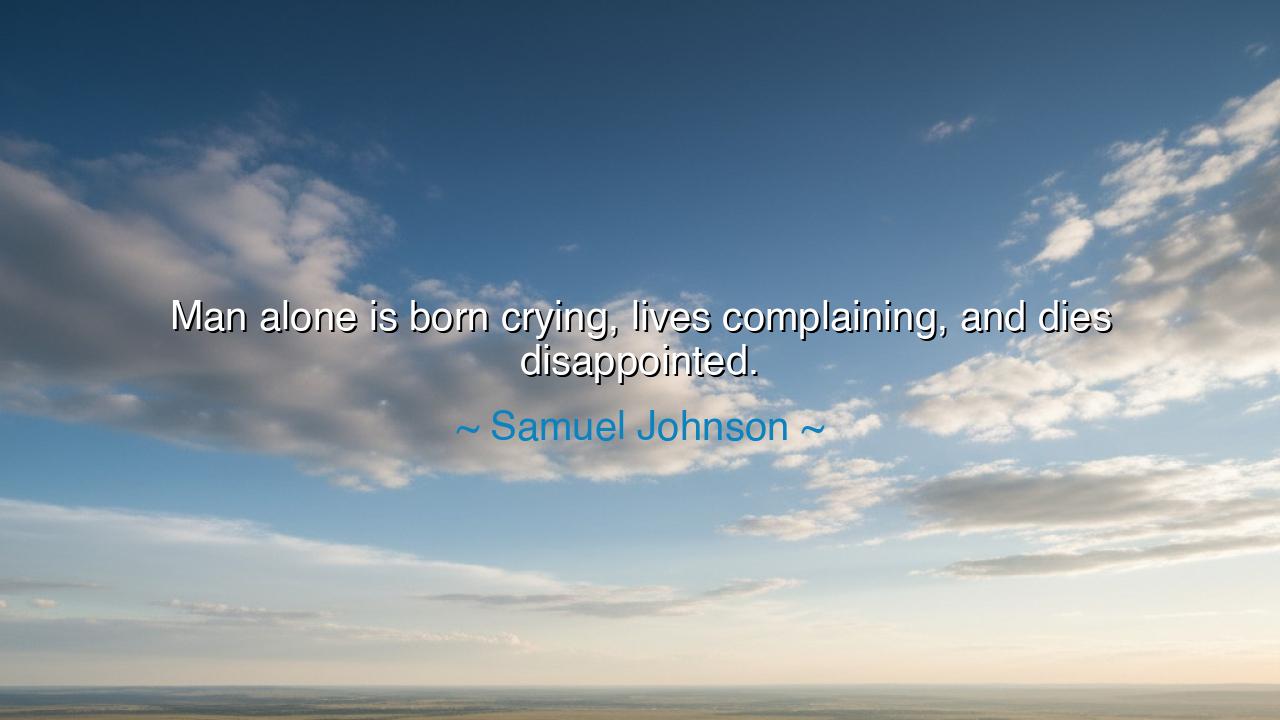
Man alone is born crying, lives complaining, and dies






In the solemn words of Samuel Johnson, the great moralist and man of letters, “Man alone is born crying, lives complaining, and dies disappointed.” Within this dark reflection shines not despair, but truth — a mirror held before the human condition. Johnson, who knew both genius and sorrow, speaks here not as a cynic, but as a physician of the soul. His observation pierces through the veil of illusion, revealing how restlessness, discontent, and longing accompany mankind from the cradle to the grave. He reminds us that to be human is to yearn, and to yearn is to suffer — yet it is also to reach, to hope, to strive toward meaning in a world that forever slips from our grasp.
“Born crying” — for even at the moment of life’s first breath, man enters the world in pain. The infant’s cry is not merely of hunger or cold, but the soul’s recognition of exile — of having left the peace of the unknown for the turbulence of existence. The ancients understood this. They said the newborn weeps because he knows the road ahead will be filled with toil, love, loss, and longing. Only man, among all creatures, is aware — dimly yet deeply — that life is impermanent. Thus begins the lifelong quest to find solace, to turn the cry of birth into the song of purpose.
And so, he lives complaining. For as man grows, he learns to speak — and with speech comes judgment. He compares, he covets, he dreams of more than what he has. The beasts of the field eat and rest content, but man, with his reason and imagination, is cursed with awareness of what is missing. He measures himself against eternity and feels small; he measures his days against his desires and finds them too short. From this gap between what is and what ought to be arises the endless murmur of complaint — the music of humanity’s dissatisfaction. Yet in that very restlessness lies the seed of greatness: for complaint, rightly understood, is the voice of a spirit that refuses to stagnate.
When Alexander the Great had conquered the known world, he wept — not from pain, but from disappointment. “There are no more worlds to conquer,” he said. Here was the embodiment of Johnson’s lament: even in triumph, man feels incomplete. The crown weighs heavy, the victory fleeting. So it is for all — from kings to commoners — that ambition never finds final satisfaction. The heart of man is infinite in its hunger, and the world is finite in what it can offer. What, then, can fill that void? Not gold, not glory, but the peace that comes from wisdom — from learning to seek within what cannot be found without.
And finally, man dies disappointed. Not because life was without beauty, but because beauty was never enough. He departs the world as he entered it — reaching for something beyond reach. Death comes not as a surprise, but as the last reminder that all earthly things are but shadows. Yet, even in that disappointment, there is a strange glory. For to die longing is to prove that the human soul was made for something higher, that its desires stretch beyond the limits of flesh and time. The very ache of disappointment reveals the existence of eternity, for only an immortal spirit could feel the pain of impermanence so deeply.
The teaching, then, is not that man is doomed to misery, but that his dissatisfaction is the sign of his divine origin. The cry, the complaint, the disappointment — these are the echoes of the eternal within the temporal. To live wisely is not to silence them, but to understand them: to see that the cure for man’s restlessness is not more possession, but more presence; not more praise, but more purpose.
So let this be the counsel to those who hear: do not curse your dissatisfaction — refine it. Let your complaint become creativity, your disappointment become discipline, your longing become love. Seek not a life without pain, but a spirit that turns pain into wisdom. When you are tempted to despair at the brevity of life, remember that even in crying, complaining, and dying, you reveal what no other creature possesses — the immortal spark that hungers for the infinite. For in the end, it is not the contented beast but the restless man who reaches heaven.
Thus speaks Samuel Johnson across the ages: man alone suffers, because man alone aspires. And though he is born crying, lives complaining, and dies disappointed, he is also the only creature who dares to hope — and it is in that hope that the divine in him forever endures.






AAdministratorAdministrator
Welcome, honored guests. Please leave a comment, we will respond soon